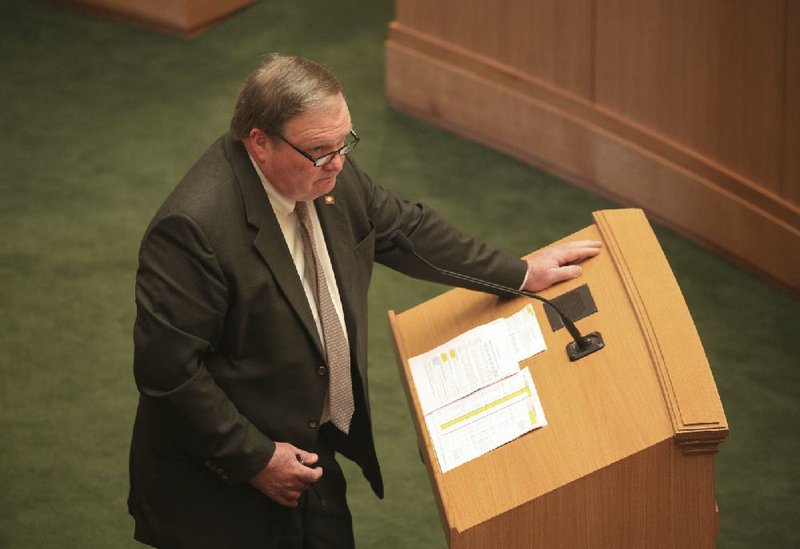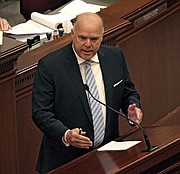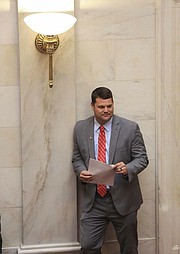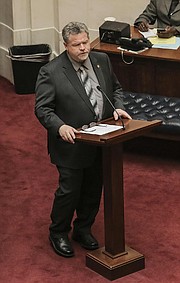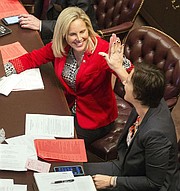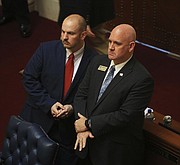With the end of the legislative session in sight, state lawmakers this week aim to work on a general revenue budget for the next fiscal year and to determine the fate of bills on taxes, educational vouchers and a proposed reorganization of state government.
They also hope to decide whether to refer more than one constitutional amendment to voters in the 2020 general election.
And the House of Representatives is expected to take a second vote on a measure granting the Department of Human Services' Division of Medical Services $8.15 billion in spending authority using state and federal funds. The bill includes spending authority for Arkansas' Medicaid expansion program that provides health insurance to about 235,000 low-income people.
The House's 52-28 vote Friday fell 23 votes short of the 75 required for approval in the 100-member House. The action came two days after a federal judge invalidated Arkansas' and Kentucky's work requirements for their Medicaid expansion programs.
The three-fourths vote required to approve the Division of Medical Services' appropriation has often been a difficult threshold to meet since the Republican-controlled Legislature created the Medicaid expansion program. The program has divided Republicans.
Today is the 78th day of the 92nd General Assembly.
[RELATED: Complete Democrat-Gazette coverage of the Arkansas Legislature]
The House and Senate may recess April 12 -- if not earlier -- and reconvene before noon May 6 to take care of matters such as fixing bills or overriding any vetoes. The session would then adjourn.
"Right now, the hope is we recess sometime that week. Whether it is the 10th or the 12th I think will be determined based on how things go in the next 10 days," Senate President Pro Tempore Jim Hendren, R-Sulphur Springs, said.
April 12 would be the 89th day. The General Assembly met in regular session for 96 days in 2011, 101 days in 2013, 82 days in 2015 and 86 days in 2017. (Fiscal sessions, in even-numbered years, are of shorter duration.)
STATE BUDGET
Legislative leaders hope to wrap up negotiations with Gov. Asa Hutchinson on the general revenue budget for fiscal 2020 by the end of this week or early next week.
The Revenue Stabilization Act distributes general revenue to various state programs each fiscal year. Approval of the measure requires a simple majority vote in each chamber, after the Joint Budget Committee endorses it.
"I would like to get it laid on [lawmakers' desks] by Friday, but it could be next Monday before we do it," a Joint Budget Committee co-chairman, Rep. Lane Jean, R-Magnolia, said Friday. "It will depend a lot on what happens [this] week."
Hutchinson said Friday in a written statement, "I continue to meet with House and Senate leadership on the development of the final budget (RSA).
"We will have two more discussions this upcoming week," he said. "The balanced budget that I presented will have some changes based upon the legislative session, but I do anticipate successfully reaching agreement on a balanced RSA budget in the coming weeks."
In November, Hutchinson proposed a general revenue budget of $5.75 billion for fiscal 2020. That's $125.2 million more than the budget for fiscal 2019, which ends June 30. Most of the increase is targeted for human services and education programs, including a boost in starting teacher salary.
"I think we are very close to where we were in the balanced budget in November, not a lot of changes," Jean said.
INTERNET SALES TAX
House Revenue and Taxation Committee Chairman Joe Jett, R-Success, said he expects the committee on Tuesday to consider a bill that would require out-of-state online sellers to collect sales and use taxes from in-state purchasers. The bill also would change the state's corporate income tax code and the taxation of carwashes.
Senate Bill 576 by Sen. Bart Hester, R-Cave Springs, failed to clear the committee Thursday. The bill's "sticking point" is the change in the taxation of carwashes, Rep. Dan Douglas, R-Bentonville, who is the House sponsor of the legislation, said Thursday.
"We are prepared to run the bill again and visit with the committee members and see if we can do anything to get the bill in a better position," Jett said Friday. The bill was already approved by the Senate.
Hendren said the Tax Reform and Relief Legislative Tax Force that he co-chaired recommended changes in the taxation of carwashes because "it was clear there is inherent unfairness in the way that taxes are being applied or not applied to carwashes, so it needs to be fixed."
"Some have said, 'Let's just exempt everybody.' I don't support that," he said.
"That was the entire purpose of the tax reform task force, is to quit making exemptions because of the political pressure or pressure brought from lobbyists or industry, who stand to gain from them. It needs to be fair, so I hope that it is left in the bill and, if there is some adjustments that need to be made to ensure that it is fair, that those are taken care of. But I don't think it is something that we just should quit because it is hard," Hendren said.
SB576 also would phase in a reduction in the top corporate income tax rate from 6.5 percent to 5.9 percent, phase in an extension of the five-year carry-forward period for businesses' net operating losses to 10 years, and provide for a single-sales factor for the apportionment formula used by corporations for income tax filings.
ANOTHER TAX BILL
Another bill that's pending is Hendren's Senate Bill 571. The bill would increase cigarette taxes and tax e-cigarettes and vaping products to finance $97 million a year in income tax cuts to help lower-income people. The bill also would create an earned income tax credit and increase the standard income tax deduction.
The current version of SB571 would reduce the rate for one of the brackets in the tax table for people with taxable income of less than $22,200 a year. That bracket is for income between $4,500 and $8,899; the rate would be reduced from the current 2 percent to 1 percent. The change would apply to tax years starting in 2020.
It also would levy a special-privilege tax on e-cigarettes that is equal to the total levied on tobacco products other than cigarettes, starting Sept. 1. The money from the tax would go to general revenue.
The bill would require the House and Senate tax and public health committees to study and recommend additional taxes on cigarettes to help offset the costs to the state of covering treatment for tobacco-related illnesses and of reducing the income tax burden on particularly low- and middle-income individuals.
SB571 has been approved by the Senate. Hendren said he's not certain whether he will present the bill to the House tax committee.
"We are still trying to see if there is any room for compromise yet. I don't have the votes down there yet," he said.
REORGANIZATION PLAN
The Senate State Agencies and Governmental Affairs Committee plans to consider on Tuesday legislation that would implement Hutchinson's proposed reorganization of state government, said the committee chairman, Sen. Ron Caldwell, R-Wynne.
House Bill 1763 by Rep. Andy Davis, R-Little Rock, would implement Hutchinson's plan to reduce the number of state agencies reporting to the governor from 42 to 15.
"We hope to have [an] amendment [to the bill] ready to adopt on Tuesday and vote on the bill and send it out of committee and hopefully send it to the chamber ... and vote in the chamber Thursday," Caldwell said Friday.
The major parts of the proposed amendment would pull the Public Service Commission out of the proposed Department of Energy and Environment and make it independent, and allow the banking, insurance and securities departments in the proposed Department of Commerce and the Plant Board in the proposed Department of Agriculture to "maintain their rule-making ability," Caldwell said.
He said he hopes Hutchinson will agree with these changes.
Hutchinson said Friday in a written statement, "I have received the various proposed amendments from Senators Caldwell and [Jimmy] Hickey, and I look forward to reviewing those over the weekend.
"I trust we will pass out a transformation bill next week," he said.
CONSTITUTIONAL CHANGES
State lawmakers may refer up to three constitutional amendments to voters in the 2020 general election.
Lawmakers already have approved referring to voters House Joint Resolution 1018 by Rep. Jeff Wardlaw, R-Hermitage. It's a proposed constitutional amendment to permanently extend the half-percent sales tax for highways. That tax was originally approved by voters in 2012 for a 10-year period.
The Senate has approved Senate Joint Resolution 15 by Sen. Alan Clark, R-Lonsdale. The House this week is expected to consider the measure, which has minor amendments. The proposal would limit state lawmakers elected on or after Jan. 1, 2021, to serving 12 consecutive years and then require them to sit out four years before becoming eligible to serve in the Legislature again.
Under House and Senate rules, a two-thirds vote is required to allow the Legislature to consider referring a third proposed amendment to voters.
Asked about the prospects of referring a third constitutional amendment to voters, House State Agencies and Governmental Affairs Committee Chairman Dwight Tosh, R-Jonesboro, said, "I visited with the speaker, and we have been checking with the committee members to try to narrow it down.
"Hopefully, we are going to start that process probably either [this] afternoon or Wednesday morning, so we are going to have it narrowed down. Come [today], we'll know whether we got one left or two left, and that's probably where we will go," he said.
Tosh said he expects a proposal to change the initiative process to be considered by the committee.
House Joint Resolution 1008, sponsored by Rep. DeAnn Vaught, R-Horatio, and Sen. Mathew Pitsch, R-Fort Smith, would:
• Require initiative petitions to be filed with the secretary of state by Jan. 15 of the year they would be voted on. Currently they are required to be filed four months before the election.
• Require a challenge to the sufficiency of a statewide ballot measure to be filed no later than April 15 of the year of the general election in which the ballot measure will be voted on.
• Eliminate the 30-day cure period, in which the sponsor of a proposed ballot measure who turns in at least 75 percent of the required valid signatures of registered voters can collect additional signatures to get the measure on the ballot.
• Require a three-fifths vote of the 35-member Senate and 100-member House to refer a proposed constitutional amendment to voters.
• Require a certain share of signatures from each of 45 counties, up from the current 15.
SCHOOL VOUCHERS
Rep. Ken Bragg, R-Sheridan, the House sponsor of Senate Bill 539 by Sen. Blake Johnson, R-Corning, said he hopes to present the bill to the House Education Committee on Tuesday.
The proposal would create a $3 million school voucher program funded by charitable contributions. It would offer individual and corporate donors dollar-for-dollar state income tax credits.
The private-school scholarships would be available to about 250 military families, foster children, students with disabilities and families whose income is below 150 percent of the amount that qualifies a student for federal school lunch-buying assistance ($69,653 for a family of four this year).
Bragg said he's been discussing the proposal with members of the House committee to garner support.
"I think it's going to be close," Bragg said of the vote. "It's possible to get the support. We'll just have to wait and see."
Information for this article was contributed John Moritz and Hunter Field of the Arkansas Democrat-Gazette.
SundayMonday on 04/01/2019
